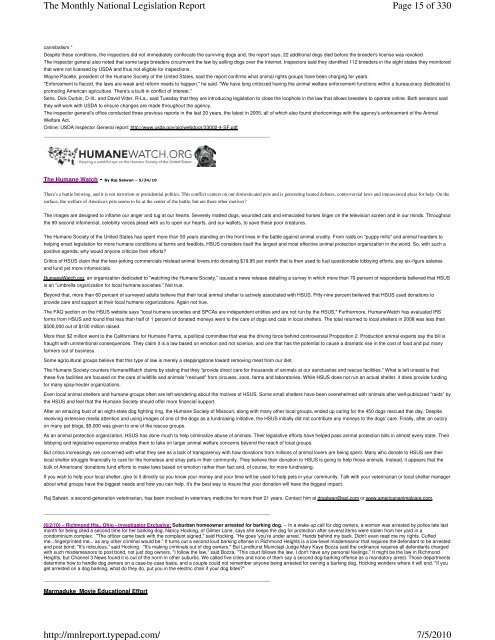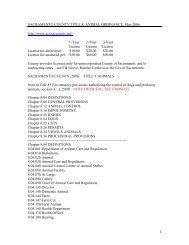Page 1 of 330 The Monthly National Legislation Report 7/5/2010 ...
Page 1 of 330 The Monthly National Legislation Report 7/5/2010 ...
Page 1 of 330 The Monthly National Legislation Report 7/5/2010 ...
You also want an ePaper? Increase the reach of your titles
YUMPU automatically turns print PDFs into web optimized ePapers that Google loves.
<strong>The</strong> <strong>Monthly</strong> <strong>National</strong> <strong>Legislation</strong> <strong>Report</strong>http://mnlreport.typepad.com/<strong>Page</strong> 15 <strong>of</strong> <strong>330</strong>7/5/<strong>2010</strong>cannibalism."Despite these conditions, the inspectors did not immediately confiscate the surviving dogs and, the report says, 22 additional dogs died before the breeder's license was revoked.<strong>The</strong> inspector general also noted that some large breeders circumvent the law by selling dogs over the Internet. Inspectors said they identified 112 breeders in the eight states they monitoredthat were not licensed by USDA and thus not eligible for inspections.Wayne Pacelle, president <strong>of</strong> the Humane Society <strong>of</strong> the United States, said the report confirms what animal rights groups have been charging for years."Enforcement is flaccid, the laws are weak and reform needs to happen," he said. "We have long criticized having the animal welfare enforcement functions within a bureaucracy dedicated topromoting American agriculture. <strong>The</strong>re's a built-in conflict <strong>of</strong> interest."Sens. Dick Durbin, D-Ill., and David Vitter, R-La., said Tuesday that they are introducing legislation to close the loophole in the law that allows breeders to operate online. Both senators saidthey will work with USDA to ensure changes are made throughout the agency.<strong>The</strong> inspector general's <strong>of</strong>fice conducted three previous reports in the last 20 years, the latest in 2005, all <strong>of</strong> which also found shortcomings with the agency's enforcement <strong>of</strong> the AnimalWelfare Act.Online: USDA Inspector General report: http://www.usda.gov/oig/webdocs/<strong>330</strong>02-4-SF.pdf____________________________________________________________________________________<strong>The</strong> Humane Watch - By Raj Salwan – 5/24/10<strong>The</strong>re's a battle brewing, and it is not terrorism or presidential politics. This conflict centers on our domesticated pets and is generating heated debates, controversial laws and impassioned pleas for help. On thesurface, the welfare <strong>of</strong> America's pets seems to be at the center <strong>of</strong> the battle, but are there other motives?<strong>The</strong> images are designed to inflame our anger and tug at our hearts. Severely matted dogs, wounded cats and emaciated horses linger on the television screen and in our minds. Throughoutthe 90-second infomercial, celebrity voices plead with us to open our hearts, and our wallets, to save these poor creatures.<strong>The</strong> Humane Society <strong>of</strong> the United States has spent more than 50 years standing on the front lines in the battle against animal cruelty. From raids on "puppy mills" and animal hoarders tohelping enact legislation for more humane conditions at farms and feedlots, HSUS considers itself the largest and most effective animal protection organization in the world. So, with such apositive agenda, why would anyone criticize their efforts?Critics <strong>of</strong> HSUS claim that the tear-jerking commercials mislead animal lovers into donating $19.95 per month that is then used to fuel questionable lobbying efforts, pay six-figure salariesand fund yet more infomercials.HumaneWatch.org, an organization dedicated to "watching the Humane Society," issued a news release detailing a survey in which more than 70 percent <strong>of</strong> respondents believed that HSUSis an "umbrella organization for local humane societies." Not true.Beyond that, more than 60 percent <strong>of</strong> surveyed adults believe that their local animal shelter is actively associated with HSUS. Fifty-nine percent believed that HSUS used donations toprovide care and support at their local humane organizations. Again not true.<strong>The</strong> FAQ section on the HSUS website says "local humane societies and SPCAs are independent entities and are not run by the HSUS." Furthermore, HumaneWatch has evaluated IRSforms from HSUS and found that less than half <strong>of</strong> 1 percent <strong>of</strong> donated moneys went to the care <strong>of</strong> dogs and cats in local shelters. <strong>The</strong> total returned to local shelters in 2008 was less than$500,000 out <strong>of</strong> $100 million raised.More than $2 million went to the Californians for Humane Farms, a political committee that was the driving force behind controversial Proposition 2. Production animal experts say the bill isfraught with unintentional consequences. <strong>The</strong>y claim it is a law based on emotion and not science, and one that has the potential to cause a dramatic rise in the cost <strong>of</strong> food and put manyfarmers out <strong>of</strong> business.Some agricultural groups believe that this type <strong>of</strong> law is merely a steppingstone toward removing meat from our diet.<strong>The</strong> Humane Society counters HumaneWatch claims by stating that they "provide direct care for thousands <strong>of</strong> animals at our sanctuaries and rescue facilities." What is left unsaid is thatthese five facilities are focused on the care <strong>of</strong> wildlife and animals "rescued" from circuses, zoos, farms and laboratories. While HSUS does not run an actual shelter, it does provide fundingfor many spay/neuter organizations.Even local animal shelters and humane groups <strong>of</strong>ten are left wondering about the motives <strong>of</strong> HSUS. Some small shelters have been overwhelmed with animals after well-publicized "raids" bythe HSUS and feel that the Humane Society should <strong>of</strong>fer more financial support.After an amazing bust <strong>of</strong> an eight-state dog fighting ring, the Humane Society <strong>of</strong> Missouri, along with many other local groups, ended up caring for the 450 dogs rescued that day. Despitereceiving extensive media attention and using images <strong>of</strong> one <strong>of</strong> the dogs as a fundraising initiative, the HSUS initially did not contribute any moneys to the dogs' care. Finally, after an outcryon many pet blogs, $5,000 was given to one <strong>of</strong> the rescue groups.As an animal protection organization, HSUS has done much to help criminalize abuse <strong>of</strong> animals. <strong>The</strong>ir legislative efforts have helped pass animal protection bills in almost every state. <strong>The</strong>irlobbying and legislative experience enables them to take on larger animal welfare concerns beyond the reach <strong>of</strong> local groups.But critics increasingly are concerned with what they see as a lack <strong>of</strong> transparency with how donations from millions <strong>of</strong> animal lovers are being spent. Many who donate to HSUS see theirlocal shelter struggle financially to care for the homeless and stray pets in their community. <strong>The</strong>y believe their donation to HSUS is going to help those animals. Instead, it appears that thebulk <strong>of</strong> Americans' donations fund efforts to make laws based on emotion rather than fact and, <strong>of</strong> course, for more fundraising.If you wish to help your local shelter, give to it directly so you know your money and your time will be used to help pets in your community. Talk with your veterinarian or local shelter managerabout what groups have the biggest needs and how you can help. It's the best way to insure that your donation will have the biggest impact.Raj Salwan, a second-generation veterinarian, has been involved in veterinary medicine for more than 21 years. Contact him at drsalwan@aol.com or www.americananimalcare.com.____________________________________________________________________________________(6/2/10) – Richmond Hts., Ohio - Investigator Exclusive: Suburban homeowner arrested for barking dog. -- In a wake-up call for dog owners, a woman was arrested by police late lastmonth for being cited a second time for her barking dog. Nancy Hocking, <strong>of</strong> Gilmer Lane, says she keeps the dog for protection after several items were stolen from her yard in acondominium complex. "<strong>The</strong> <strong>of</strong>ficer came back with the complaint signed," said Hocking. "He goes 'you're under arrest.' Hands behind my back. Didn't even read me my rights. Cuffedme...fingerprinted me... as any other criminal would be." It turns out a second loud barking <strong>of</strong>fense in Richmond Heights is a low-level misdemeanor that requires the defendant to be arrestedand post bond. "It's ridiculous," said Hocking. "It's making criminals out <strong>of</strong> dog owners." But Lyndhurst Municiapl Judge Mary Kaye Bozza said the ordinance requires all defendants chargedwith such misdemeanors to post bond, not just dog owners. "I follow the law," said Bozza. "This court follows the law. I don't have any personal feelings." It might be the law in RichmondHeights, but Channel 3 News found it is out <strong>of</strong> the norm in other suburbs. We called five cities and none <strong>of</strong> them say a second dog-barking <strong>of</strong>fense as a mandatory arrest. Those departmentsdetermine how to handle dog owners on a case-by-case basis, and a couple could not remember anyone being arrested for owning a barking dog. Hocking wonders where it will end. "If youget arrested on a dog barking, what do they do, put you in the electric chair if your dog bites?"____________________________________________________________________________________Marmaduke Movie Educational Effort




